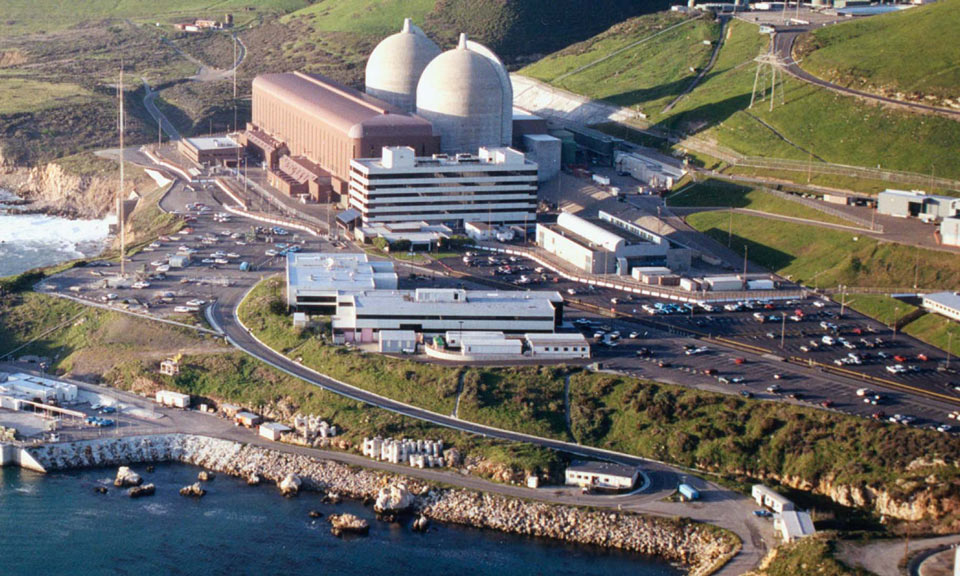
Diablo Canyon Power Plant
Credit: PG&E
March 1, 2023 - SACRAMENTO — The California Energy Commission (CEC) on Tuesday approved a staff analysis recommending the state pursue extending operation of Diablo Canyon Power Plant (DCPP) through 2030 to ensure electricity reliability. The determination is based on data showing California risks energy supply shortfalls during extreme weather events driven by climate change.
Senate Bill 846 (Dodd, 2022) requires the CEC to determine the need to extend DCPP’s license to operate beyond its expiration date of 2025. Located in San Luis Obispo County, DCPP is owned and operated by Pacific Gas and Electric Company (PG&E). The nuclear power plant supplies about 17 percent of California’s zero-carbon electricity and 9 percent of total electricity. An extension allows the state to rely less on natural gas and more on clean resources for the electricity grid.
“As California confronts a rapidly changing climate, extraordinary heat events and record energy demand are becoming increasingly ordinary. The state needs to keep all options on the table to protect public health and safety,” said CEC Vice Chair Siva Gunda. “This includes maintaining Diablo Canyon’s operations to support reliability statewide in the near-term. An extension would allow more time for additional clean energy projects to come on-line as we work on the long-term transition away from fossil fuels.”
The determination comes as California is experiencing a substantial shift in conditions affecting the electric grid, which is transitioning to the state’s clean energy future, while confronting the impacts of climate change. This includes extreme heat and wildfires that threaten the grid with growing frequency and intensity. On September 6, 2022, the California ISO (ISO) reached a new all-time high peak load of 52,061 megawatts (MW) during a record-breaking 10-day heat wave, nearly 2,000 MW higher than the previous record. Updated forecasts show this type of extreme event is increasingly likely to occur because of rising temperatures.
The CEC will publish additional analysis this year comparing the cost of alternatives to the cost of extending DCPP. At the same time, the California Public Utilities Commission (CPUC) is evaluating how extension impacts electricity rates. Ultimately, the United States Nuclear Regulatory Commission will consider whether to approve PG&E’s application to extend the plant’s operating license.
Accelerating Clean Energy Development
The state is continuing to invest in rapidly building out clean energy capacity as emphasized in the report. Today, the CEC approved a $1 billion investment plan for clean energy resources as required by SB 846. The Clean Energy Reliability Investment Plan prioritizes funding for efforts that accelerate the deployment of clean energy resources, support demand response, assist ratepayers, and increase energy reliability.
In 2021, the CPUC ordered the state’s investor-owned utilities to bring 11,500 MW of new clean electricity resources on-line from 2023 to 2026. Last week, the CPUC ordered an additional 4,000 MW of new clean energy capacity between 2027 and 2028. However, lingering pandemic-related supply chain disruptions continue to cause project delays.
To help overcome barriers, the CEC, CPUC, ISO, and Governor’s Office have substantially increased coordination to track new clean energy projects under development through the Tracking Energy Development Task Force.
Governor Gavin Newsom also signed Assembly Bill 205 (Committee on Budget, 2022), creating a streamlined permitting approach at the CEC to provide a timely and efficient permitting process for non-fossil fuel, clean energy projects. This new option will help fast-track the deployment of clean energy in California to allow the eventual retirement of fossil-fuel based resources.
Fast Facts About Diablo Canyon Power Plant
- Location: San Luis Obispo County
- Owner and Operator: Pacific Gas and Electric Company
- Energy Generation: Supplies 17% of California’s zero-carbon electricity and 9% of total electricity
- Licensing Agency: United States Nuclear Regulatory Commission
- License Expiration Date: Currently scheduled for phased retirement in 2024 and 2025
About the California Energy Commission
The California Energy Commission is the state's primary energy policy and planning agency. It has seven core responsibilities: advancing state energy policy, encouraging energy efficiency, certifying thermal power plants, investing in energy innovation, developing renewable energy, transforming transportation, and preparing for energy emergencies.
Source: CEC

